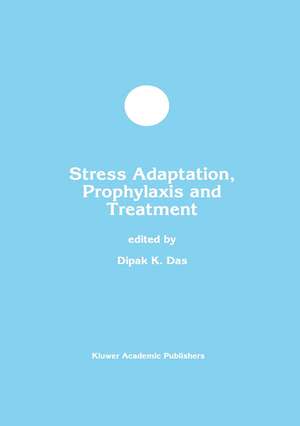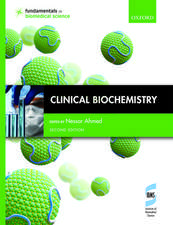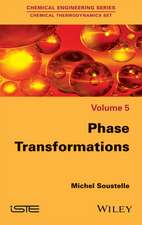Stress Adaptation, Prophylaxis and Treatment: Developments in Molecular and Cellular Biochemistry, cartea 32
Editat de Dipak K. Dasen Limba Engleză Paperback – 23 oct 2012
| Toate formatele și edițiile | Preț | Express |
|---|---|---|
| Paperback (1) | 643.00 lei 6-8 săpt. | |
| Springer Us – 23 oct 2012 | 643.00 lei 6-8 săpt. | |
| Hardback (1) | 578.78 lei 38-45 zile | |
| Springer Us – 31 iul 1999 | 578.78 lei 38-45 zile |
Din seria Developments in Molecular and Cellular Biochemistry
- 5%
 Preț: 389.20 lei
Preț: 389.20 lei - 24%
 Preț: 1056.97 lei
Preț: 1056.97 lei - 18%
 Preț: 1223.70 lei
Preț: 1223.70 lei - 24%
 Preț: 1060.04 lei
Preț: 1060.04 lei -
 Preț: 404.29 lei
Preț: 404.29 lei - 5%
 Preț: 371.30 lei
Preț: 371.30 lei - 18%
 Preț: 1555.51 lei
Preț: 1555.51 lei - 5%
 Preț: 734.57 lei
Preț: 734.57 lei - 24%
 Preț: 1568.12 lei
Preț: 1568.12 lei - 24%
 Preț: 1580.08 lei
Preț: 1580.08 lei - 24%
 Preț: 1584.02 lei
Preț: 1584.02 lei - 5%
 Preț: 365.61 lei
Preț: 365.61 lei - 24%
 Preț: 1564.06 lei
Preț: 1564.06 lei - 24%
 Preț: 1077.72 lei
Preț: 1077.72 lei - 15%
 Preț: 582.59 lei
Preț: 582.59 lei - 24%
 Preț: 1583.80 lei
Preț: 1583.80 lei - 5%
 Preț: 671.23 lei
Preț: 671.23 lei - 18%
 Preț: 1222.62 lei
Preț: 1222.62 lei - 24%
 Preț: 801.38 lei
Preț: 801.38 lei - 24%
 Preț: 1098.57 lei
Preț: 1098.57 lei - 18%
 Preț: 940.09 lei
Preț: 940.09 lei - 24%
 Preț: 1060.10 lei
Preț: 1060.10 lei - 5%
 Preț: 1003.85 lei
Preț: 1003.85 lei - 18%
 Preț: 935.67 lei
Preț: 935.67 lei - 5%
 Preț: 1418.48 lei
Preț: 1418.48 lei - 24%
 Preț: 795.19 lei
Preț: 795.19 lei - 18%
 Preț: 947.18 lei
Preț: 947.18 lei - 24%
 Preț: 808.09 lei
Preț: 808.09 lei - 18%
 Preț: 951.29 lei
Preț: 951.29 lei
Preț: 643.00 lei
Preț vechi: 756.47 lei
-15% Nou
Puncte Express: 965
Preț estimativ în valută:
123.05€ • 128.63$ • 103.98£
123.05€ • 128.63$ • 103.98£
Carte tipărită la comandă
Livrare economică 07-21 martie
Preluare comenzi: 021 569.72.76
Specificații
ISBN-13: 9781461373193
ISBN-10: 1461373190
Pagini: 200
Ilustrații: V, 188 p.
Dimensiuni: 210 x 297 x 11 mm
Greutate: 0.49 kg
Ediția:Softcover reprint of the original 1st ed. 1999
Editura: Springer Us
Colecția Springer
Seria Developments in Molecular and Cellular Biochemistry
Locul publicării:New York, NY, United States
ISBN-10: 1461373190
Pagini: 200
Ilustrații: V, 188 p.
Dimensiuni: 210 x 297 x 11 mm
Greutate: 0.49 kg
Ediția:Softcover reprint of the original 1st ed. 1999
Editura: Springer Us
Colecția Springer
Seria Developments in Molecular and Cellular Biochemistry
Locul publicării:New York, NY, United States
Public țintă
ResearchCuprins
Myocardial preconditioning: Basic concepts and potential mechanisms.- Regulation of cardiomyocyte apoptosis in ischemic reperfused mouse heart by glutathione peroxidase.- Thrombin releases calcium from internal stores of ultraviolet C-treated V79 fibroblasts independent of phosphatidylinositol bisphosphate hydrolysis: Role of oxidative stress.- Glutathione homeostasis in response to exercise training and nutritional supplements.- Mechanisms of beneficial effects of probucol in adriamycin cardiomyopathy.- Myocardial oxidative stress changes during compensated right heart failure in rats.- Reactive oxygen species function as second messenger during ischemic preconditioning of heart.- The role of oxidative stress in diseases caused by mineral dusts and fibres: Current status and future of prophylaxis and treatment.- Endotoxin-induced alterations in hepatic glucose-6-phosphatase activity and gene expression.- Oxidative stress in Systemic Sclerosis.- Signal transduction and transcriptional adaptation in embryonic heart development and during myocardial hypertrophy.- The cytotoxic effects of a novel IH636 grape seed proanthocyanidin extract on cultured human cancer cells.- Acute and chronic stress-induced oxidative gastrointestinal mucosal injury in rats and protection by bismuth subsalicylate.- Stress genes and species survival.- Fever: An integrated response of the central nervous system to oxidative stress.- Enhanced expression and localization of heme oxygenase-1 during recovery phase of porcine stunned myocardium.- Heterogeneity of human red blood cell membrane: Co-existence of heavy and light membranes.- Schisandrin B protects against myocardial ischemia-reperfusion injury by enhancing myocardial glutathione antioxidant status.- Scavenging of superoxide anion radical bychaparral.- Role of Fe(III) in Fe(II)citrate-mediated peroxidation of mitochondrial membrane lipids.- Studies on hepatic oxidative stress and antioxidant defence systems during arteether treatment of Plasmodium yoelii nigeriensis infected mice.- Effect of Salmonella typhimurium enterotoxin (S-LT) on lipid peroxidation and cell viability levels of isolated rat enterocytes.- Index to Volume 196.














